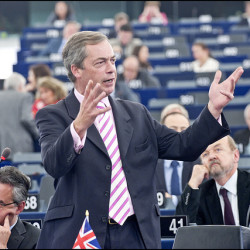Coverage and analyses of the recent British general election of 7 May have focused predominantly on the surprise victory of the Conservatives, the poor showing of Labour, and the close to clean sweep of the Scottish National Party (SNP). The performance of the UK Independence Party (UKIP), meanwhile, was generally perceived to be disappointing for the party of Nigel Farage. Indeed, it has been argued that, despite the high expectations of the past years, UKIP fell well short of causing a ‘Purple Revolution’. At the end of 2014 the party were trending at around 20 per cent in several opinion polls with some excitable elements in the media claiming the party could win as many as 40 seats in the general election. Given this narrative was just six months before the election, their final result of just one seat compounded the apparent failure of Farage’s ‘People’s Army’ to mobilise.
However, if we consider the number of votes UKIP received, the interpretation of UKIP’s performance as a total failure is incorrect. The party secured 12.6 per cent of the vote, making it Britain’s third largest party in terms of vote share. UKIP quadrupled its pervious share of the vote of 2010. With these levels of support, the party has ostensibly become a prominent member of the Western European populist right, which includes parties sharing a populist anti-establishment appeal and a negative attitude towards immigration and European integration. While parties such as the Austrian Freedom Party and the True Finns may have scored better in their most recent national elections, UKIP’s share of the vote is very similar to the results of the French Front National (2012: 13.6%), the Danish People’s Party (2011: 12.3%) and the Dutch Freedom Party (2012: 10.1%).
Naturally, in terms of seats gained UKIP’s performance can hardly be interpreted as a striking victory. Despite the surge in its vote share, the party actually lost one of its two MPs—both of whom defected from the Conservative Party in the preceding parliamentary term. UKIP’s national support was spread out too thinly for it to turn its vote share into seats; this was in stark contrast to the SNP, which needed only 4.7 per cent of the nation-wide vote to obtain 56 seats. While winning only one seat, UKIP nevertheless came second in 120 constituencies. The results indicated that UKIP had built up strong local bases of support and the party showed their ability to attract former Tory and Labour voters alike. UKIP has scored second places both in rural rich areas in Southern England and the poorer post-industrial regions of Northern England.
What is more, UKIP’s clout in British politics is also apparent if we look beyond electoral developments. Prime Minister David Cameron’s promise to hold an in-or-out referendum on British EU membership (were the Tories to win the 2015 election) was ostensibly triggered in part by the pressure from UKIP in the opinion polls. This emboldened ‘hard Eurosceptic’ Tory backbenchers to demand the pledge to hold a referendum less the Conservatives lose more support to UKIP. This pledge will now be followed through and Britain will have its first referendum on Europe since 1975. Despite relatively favourable opinion polls for remaining in the EU, the UK has moved closer towards leaving the EU – or ‘Brexit’ as it has been dubbed in the media. This has become the defining post-election issue for the British government; Cameron has made this his immediate priority and has engaged in a period of sustained diplomacy with EU leaders to renegotiate the British terms of EU membership. The British relationship with the EU will be resolved one way or another within the next 15 months.
What has been forgotten in the rush to examine the big picture of the ‘Brexit’ referendum is how it was the UKIP’s surge in the polls in the previous years that forced Cameron’s hand in pledging to hold a referendum. He did this out of necessity. Voters who were considering voting UKIP as a means of getting a referendum on British membership of the EU could now vote for the Conservatives to ensure the same outcome. That negated the EU issue for UKIP and forced them to focus on more substantive issues such as immigration, but also the economy and the budget deficit where the Conservatives had a much stronger reputation.
Surely then, how to interpret the performance of UKIP is a matter of perspective. If the party’s aim was to quickly grow out into a permanent political force with a more elaborate ideological profile and substantial parliamentary representation, the 2015 election has provided little reason for optimism. Indeed, judging from Farage’s extensive focus on immigration-related issues during the campaign, UKIP’s leader intended to extend the party’s appeal beyond Euroscepticism.
This, and some of Farage’s suggestions like barring people with HIV from Britain, was not to the liking of everyone in the party. Among those who felt unease about Farage’s remarks was UKIP’s only MP Douglas Carswell. Furthermore, clearly not all UKIPers were happy with Farage’s reversal of his decision to step down as party leader—apparently in response to pleas from the party’s national executive committee to stay on. Shortly after the general elections the first internal spats and purges were already visible. UKIP has been plagued by infighting in the past, and now that Farage appears to have become a divisive figure, the greatest threat for the party is, once more, internal disunity.
What is clear, however, is that the ’bad result’ of UKIP is first of all due to the mechanical effects of the British electoral system, and not to a lack of popular support. The ‘first past the post’ system tends to produce peculiar results now that voters across the different parts of Britain increasingly look beyond the two main parties. Despite the fact that the populist right has only minimal parliamentary representation in the UK, it would be wrong to suggest that there is no place for it in British politics. UKIP have placed themselves as the second party in 120 constituencies. Crucially, they appealed to both disgruntled Conservative and Labour voters. Their fortunes are not just tied to the ability of the Tories to negotiate an ‘acceptable’ deal with the EU but also on the ability of the Labour Party to reconnect with working class English voters. Moreover, they played a central role in causing the forthcoming EU membership referendum to be held.
This is not only evidence of their influence on the British political narrative but it also provides them with a stand-alone opportunity to present their anti-elite bona fides to the British electorate. All the major parties will campaign for a vote to stay in—there will only be a few defectors from the Tories. Thus, UKIP will legitimately be able to claim to be the only party to represent the many voters who will vote ‘No’. Despite the strong likelihood of a vote to stay in the EU, UKIP cannot lose in that respect. They emerge from the referendum campaign as the true anti-establishment party, with the chance to sweep the 2019 European elections and to break through the FPTP system in the 2020 General Election by winning multiple seats in the House of Commons. That, of course, is on the condition that UKIP can keep their act together and prevent internal disputes from getting out of hand. The challenge UKIP face now is to maintain party discipline and develop a strong campaign organisation to take maximum advantage of the referendum campaign and build toward the next general election.
This post is part of our Decision 2015 series.









1 Comment
Political parties that hold minority views or that tolerate a wide range of opinions get lost under FPTP. Conversely, populist parties that appeal to a gang mentality (you’re strong if you belong with us, and rubbish if you’re don’t) are more likely to collect that critical mass of votes to succeed under FPTP.
Both Conservative and Labour tend to adopt a rather populist stance for that reason. The danger under FPTP is that a more populist right wing party will be able to form a government from only a minority of votes.
There are many benefits to be had from democracy, but an important one is the prevention of “extremist” parties taking control of a country. But for that to work, a democratic proportional voting system is required. Our democracy is diminished by the lack of such a system.